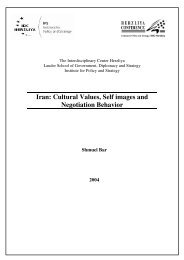Bashar's Syria: The Regime and its Strategic Worldview Shmuel Bar ...
Bashar's Syria: The Regime and its Strategic Worldview Shmuel Bar ...
Bashar's Syria: The Regime and its Strategic Worldview Shmuel Bar ...
You also want an ePaper? Increase the reach of your titles
YUMPU automatically turns print PDFs into web optimized ePapers that Google loves.
416 S. <strong>Bar</strong>in the wake of the al-Hariri affair. It is claimed that the Saudis received information abouta possible threat to al-Hariri’s life, <strong>and</strong> sent a special emissary who warned Bashar not toharm al-Hariri. <strong>The</strong> Saudis therefore have no doubts regarding <strong>Syria</strong>n responsibility for theassassination.This is not to say that Saudi Arabia will take active steps to topple the regime inDamascus or replace Bashar. Saudi policy is first <strong>and</strong> foremost one of stability <strong>and</strong> continuity.It will, however, not go out of <strong>its</strong> way to save Bashar if the threat to his regime comes frominside <strong>Syria</strong>.JordanJordan’s relations with <strong>Syria</strong> were strained for most of the last decade of Hafez al-Asad’s rule.<strong>The</strong> animosity between the two countries goes back to the <strong>Syria</strong>n invasion of Jordan duringthe “Black September” events of 1971, attempts by <strong>Syria</strong> to assassinate senior Jordanianpoliticians (including former Prime Minister Mudar Badran), <strong>and</strong> other <strong>Syria</strong>n subversionin Jordan. <strong>The</strong> <strong>Syria</strong>ns, for their part, accused Jordan of actively aiding <strong>and</strong> abetting the<strong>Syria</strong>n Muslim Brotherhood during the uprising of the early 1980s <strong>and</strong>, of course, betrayingthe Arab <strong>and</strong> Palestinian cause by signing a peace treaty with Israel.One of Bashar’s first overtures as president towards his neighbors was to “depoliticize”the relations with Amman. Soon after he had inaugurated diplomatic relations between thetwo countries (23 December 2000), <strong>and</strong> economic relations received a boost.<strong>The</strong> conventional wisdom in the early days of Bashar’s rule tied him together with KingAbdallah II of Jordan <strong>and</strong> King Mohammad VI of Morocco as the “internet generation” ofArab rulers. However, strong relations between Bashar <strong>and</strong> Abdallah did not develop. <strong>The</strong>latter had taken a firm position alongside the U.S. War on Terrorism (including reducingthe activities of Palestinian Hamas, which is supported by Damascus), was increasinglyuncomfortable with <strong>Syria</strong>n heavy-h<strong>and</strong>edness in Lebanon <strong>and</strong> <strong>its</strong> support of the Iraqi insurgency,<strong>and</strong> refused to downgrade <strong>its</strong> relationship with Israel. Nevertheless, Jordan is acutelyaware of possible fallout resulting from instability in <strong>its</strong> northern neighbor <strong>and</strong> would preferthe status quo over any upheaval in Damascus.EgyptRelations between <strong>Syria</strong> <strong>and</strong> Egypt have historically reflected the fluctuations in <strong>Syria</strong>’sregional status. After the Israeli–Egyptian peace treaty of 1979 <strong>Syria</strong> gained preeminenceas the leading Arab state in the anti–Camp David bloc <strong>and</strong> led the campaign for suspensionof Egypt’s membership in the Arab League <strong>and</strong> <strong>its</strong> affiliate associations. Later, after the 1982war in Lebanon, <strong>Syria</strong> began to improve relations with Cairo. Over the years relations weremarked by continual consultations between the aging Hafez al-Asad <strong>and</strong> Husni Mubarak.This relationship—like many in the Arab world—was primarily a personal one, <strong>and</strong>changed with the death of Hafez al-Asad. <strong>The</strong>re are clear signs that Mubarak has beenexasperated by the <strong>Syria</strong>n President’s hard-line rhetoric <strong>and</strong> has given many indicationsthat he views him as a “childish” individual. 142 This is in line with Mubarak’s status (alongwith Muammar Qaddafi) as a virtual “elder statesman” of the Arab world since the deathsof Kings Hasan of Morocco <strong>and</strong> Hussein of Jordan, President Hafez al-Asad, <strong>and</strong> YasserArafat. 143 It is, however, <strong>Syria</strong>’s declining international status that provides Egypt with anopportunity to play a more pivotal role both in restraining Bashar <strong>and</strong> staving off moreintense American pressure.
















